Twenty years ago, I was a fly fishing guide on the Henry’s Fork, which, as most of you know, is one of the world’s most famous trout streams. Anglers from all over the globe visited Last Chance, Idaho in the hope of catching a few of those spectacular Henry’s Fork rainbows, and a fair number of those anglers hired guides to increase their odds of success..
Back in 1992, a fellow by the name of Motorcycle Mike was a fixture in Last Chance. If you believed his stories, Mike had at various times been a heart surgeon, a tarpon guide in the Florida Keys, and a colonel in the military. Regardless, Mike spent the spring and summer of ‘92 sweeping the floor in the A-Bar and doing odd jobs for local businesses and homeowners. During our occasional conversations it became painfully clear that Mike knew almost nothing about trout fishing on the Henry’s Fork.
Now none of this would have mattered if Mike didn’t make a habit of riding his little motorcycle to the river, finding a prominent position on the bank, and dispensing his angling wisdom to every drift boat that floated past.
When it happened to me - and it did - my clients invariably wanted to know who Mike was, and why he was telling us to fish with totally different flies and different techniques. Which, unfortunately, left me little choice but to tell them the truth; that Mike was pretty much clueless. He had no idea what he was talking about. As I explained to my clients, if we went ahead and followed his advice we probably wouldn’t catch a single fish.
Did I enjoy telling my anglers about Motorcycle Mike? No, I didn’t. It was actually embarrassing to talk about him. Who knows what deep seated psychological urge led him to shout instructions about a subject he didn’t understand? But when people asked - and they did - I felt like I had to be honest.
So why am I bringing up Motorcycle Mike right now? Because I’m running across more and more people who act just like him. They grab a prominent position on the internet, or in the local paper, and proceed to tell us why our most accomplished scientists are completely wrong, and why climate change - the number one threat to anglers the world over - is a hoax, or a conspiracy, or a communist plot.
I’m not sure where this alternate reality comes from, or why so many people are willing to dismiss the huge - and I truly do mean “huge” - preponderance of scientific evidence on climate change; or for that matter, why they’re willing to rely on so much dubious information from so many dubious sources.
All I can say for sure is that the Motorcycle Mike analogy is almost perfect. We’re paying our top climate scientists to help us navigate a dangerous, boulder-strewn river, yet we can’t stop listening to the crazy guy yelling instructions from the bank.




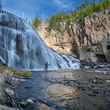

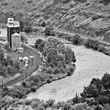
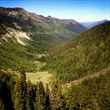
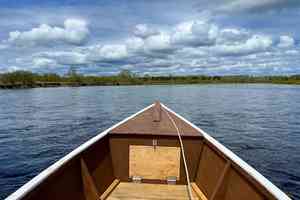


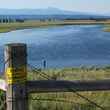

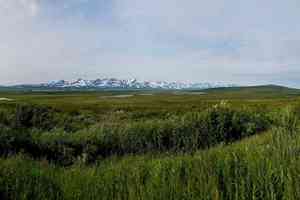

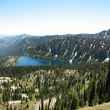












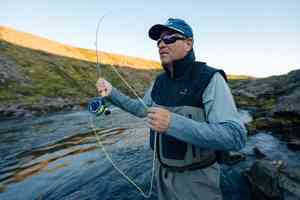




Comments
mememine69 replied on Permalink
Is science 95% certain the planet is not flat as well being 95% certain of a CO2 crisis?
If science "can't" say their own 32 year old "possible"; "Threat To The Planet" is as certain as they "believe" smoking WILL cause cancer then climate action will never happen. Deny that!
Not one single IPCC warning says; "will be" a crisis or is "inevitable" or anything beyond "could be" and "95%" certainty of a global climate crisis.
32 MORE years of "could be" is unsustainable.
Anonymous replied on Permalink
The IPCC document is a consensus document written by 120 governments ("Intergovernmental Panel on Climate Change"), including oil-producing countries (like ours). To expect "certainty" from that body, particularly to delay action until such "certainty" emerges, would be foolish. Every worst-case scenario could occur and there would still be some petro-industry-funded scientist claiming that the impacts from greenhouse gas emissions were actually caused by hybrid vehicles, or maybe whales.
Todd Tanner replied on Permalink
FYI: "Climate Risks as Conclusive as Link between Smoking and Lung Cancer: U.S. scientists say the evidence linking rising levels of greenhouse gases and global warming is as strong as the link between smoking and lung cancer."
http://www.scientificamerican.com/article/climate-risks-as-conclusive-as...
Steve K replied on Permalink
I don’t the think the question is merely whether climate change is real - - of course it is. The valid question remains what proportion of that change is anthropogenic (man-caused), and how effective a major change in our lifestyles and culture will be in averting climate crisis or catastrophe.
For example, as we consider the effects of drought on our western fisheries, the San Jose Mercury News published a chart showing that our worst droughts occurred in medieval times, well prior to any known anthropogenic causation.
http://www.mercurynews.com/science/ci_24993601/california-drought-past-d...
The anonymous poster above says that to delay action until “certainty” emerges would be foolish. Consider what kind of action would be most appropriate if the problem - and the solution - is anthropogenic: Typically, the single largest contributor of an individual’s carbon footprint is air travel.
http://www.nytimes.com/2013/01/27/sunday-review/the-biggest-carbon-sin-a...
Thus, the most effective immediate action would be to cancel all our fishing vacations, tours, and guided trips, etc. that require air travel.
Sounds like I’ve already missed my Last Chance to fish Henry’s Fork.
Bob Salcedo replied on Permalink
On the snarky side of things, I've never heard anyone regret the glacial melting that left Yosemite Valley in its wake, or the Grand Canyon of the Yellowstone. Nor the horrible erosion that left us the Grand Canyon. I do my part to reduce my usage, I shower in water from the Owens River (CA.) most days, and I limit my usage of wood in every way I can. I charge my cell and computers with a little solar panel or off my car as I drive a compact car (don't really need a truck) and I cherish the places I get to fish or not but the hysteria on both sides is tiresome. Yes, the weather changes. Always has, always will.
Todd Tanner replied on Permalink
Great question, Steve K. A few points I should make:
People are causing climate change.
We can indeed do something about it.
We need to, because otherwise we're in serious trouble.
We should all advocate for strong measures to reduce our greenhouse gas emissions.
You should still go fishing. Especially on the Henry's Fork.
The idea here isn't to do away with modern living. It's to lower our impact on the planet and preserve our fishing for future generations. We can do that by using clean, renewable energy.
Steve K replied on Permalink
Todd, Germany has certainly taken the lead on renewables with their Energiewende program. But the result is that their electric rates have gone up 60% in 5 years, and their renewable sources have so far only displaced nuclear power generation, without much reduction in fossil fuel use. They estimate the program will eventually consume half their GDP.
If fossil fuel use is truly what's causing significant climate change, then it appears some aspect of modern life is going to be done away.
There's a famous survey indicating that 97% of scientists believe in climate change, depending on how the question is asked. However, using the same datasets, only 36% of the same scientists could be said to believe it is significantly anthropogenic. Does that mean the other 64% of scientists are Motorcycle Mike?
If modern society is going to commit 50% of its GDP on greenhouse gas reduction, maybe we really do need a higher degree of consensus on the significance of anthropogenic causation.
Todd Tanner replied on Permalink
Steve K - Briefly, I’ve seen some very different numbers on the cost side, and I can dig those out if you’re interested. (It will have to be next week, as we’re heading out on a camping trip tomorrow, and I’m up to my ears until then.)
Germany is an interesting case, and I’m not sure you’ve mentioned all the relevant data.
As far as consensus on human-caused (anthropogenic) climate change - I’m just going to copy & paste something I shared yesterday on another site:
The U.S. National Academy of Sciences, the most respected scientific body on the planet, says: “Climate change is occurring, is very likely caused primarily by the emission of greenhouse gases from human activities, and poses significant risks for a range of human and natural systems.”
So who agrees with the NAS?
NASA
NOAA
American Association for the Advancement of Science American Astronomical Society
American Chemical Society
American Geophysical Union
American Institute of Physics
American Meteorological Society
American Physical Society
Australian Meteorological and Oceanographic Society Australian Bureau of Meteorology and the CSIRO
British Antarctic Survey
Canadian Foundation for Climate and Atmospheric Sciences Canadian Meteorological and Oceanographic Society Environmental Protection Agency
European Federation of Geologists
European Geosciences Union
European Physical Society
Federation of American Scientists
Federation of Australian Scientific and Technological Societies Geological Society of America
Geological Society of Australia
Geological Society of London
International Union for Quaternary Research (INQUA) International Union of Geodesy and Geophysics
National Center for Atmospheric Research
National Oceanic and Atmospheric Administration
Royal Meteorological Society
Royal Society of the UK
Academia Brasiliera de Ciencias (Brazil)
Royal Society of Canada
Chinese Academy of Sciences
Academie des Sciences (France)
Deutsche Akademie der Naturforscher Leopoldina (Germany) Indian National Science Academy
Accademia dei Lincei (Italy)
Science Council of Japan
Academia Mexicana de Ciencias (Mexico)
Russian Academy of Sciences
Academy of Science of South Africa
And who disagrees? Which major scientific organization says that climate change is a hoax? None. Not one single respected scientific organization disputes that people are warming the planet and putting our future at risk.
As for the 97% figure, four different scientific studies:
Oreskes (2004)
Doran (2009)
Anderegg (2010)
Cook (2013)
put the scientific consensus among scientists actively working on climate change at approximately 97%.
Here's what NASA has to say on the subject: "Ninety-seven percent of climate scientists agree that climate-warming trends over the past century are very likely due to human activities, and most of the leading scientific organizations worldwide have issued public statements endorsing this position."
http://climate.nasa.gov/scientific-consensus/
Earlier this year, Dr. James Powell researched all the peer-reviewed climate papers published in scientific journals in 2013. He found 10,885 different papers. 10,883 of the papers accepted man-made global warming. 2 rejected it. I'm not sure how we'll ever come up with a consensus greater than 10,883 to 2.
http://www.jamespowell.org
Have to run. Hope that gives you some info to think about over the weekend.
Steve K replied on Permalink
Thanks for the links. Cook's 2013 statistical analysis was a very distorted view of the abstracts that he claimed represented his position. I don't know about the others. Again, virtually everyone (including those labeled as "deniers") believes there is climate change, and that anthropogenic CO2 sources contribute to it - -the question is to what degree: 10%?... 25%?... MOST of it?
Let's say for sake of discussion that we agree we do have some significant impact; then by all means, let's do get on board. But let's not kid ourselves that it's a few minor adjustments in someone else's lifestyle. If it takes half the GDP of Germany to do it (as yesterday's Wall Street Journal reported), then we have some serious personal choices to make. Our federal government has already committed to spend 85% of its $2.3 trillion projected budget increases in the next decade on 3 things: Social Security, healthcare, and interest payments. Clearly, radical change will be needed from a source other than government funds.
I myself just got my latest building project certified LEED Gold. But let's not kid ourselves, it was astoundingly expensive to reduce that carbon footprint, and that cost gets passed along to others.
ginkthefly replied on Permalink
I'm more interested in why people want to dis-believe in climate change. What are they fighting for?
Fighting for a change to the way we use energy means fighting to defend our hunting and fishing lands, our clean water and our national heritage against a handful of corporate raiders that would see that all dashed in the name of higher share prices.
Fighting against it means fighting for higher share prices that benefits none but a select few of us (and not the select few that cares about our public lands).
I guess propaganda can trump common sense with relative ease as long as the machine spewing it is big enough.
Pages